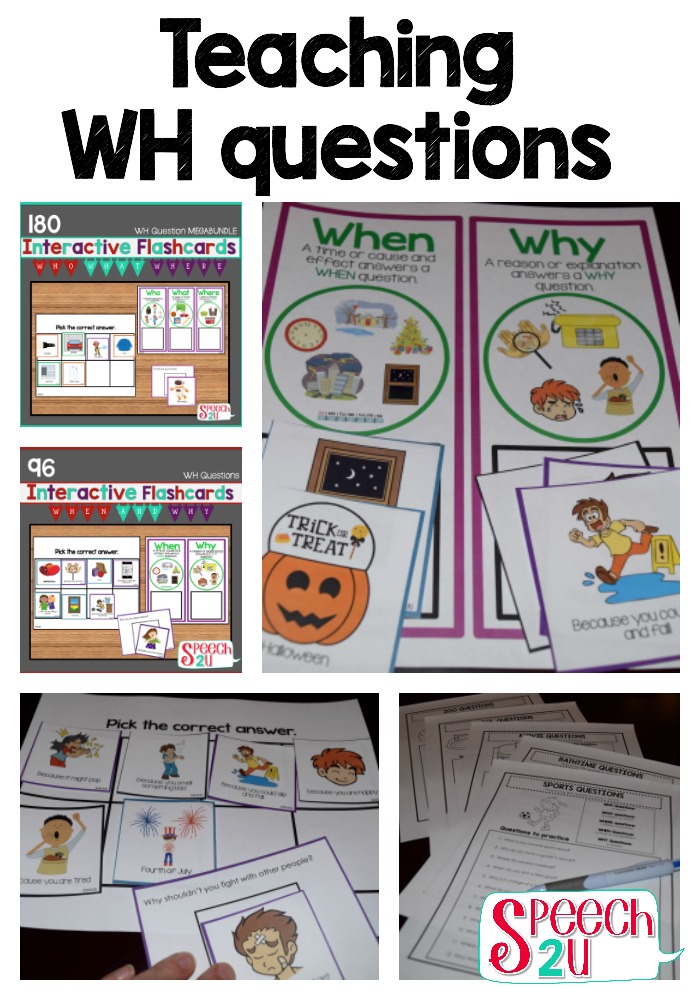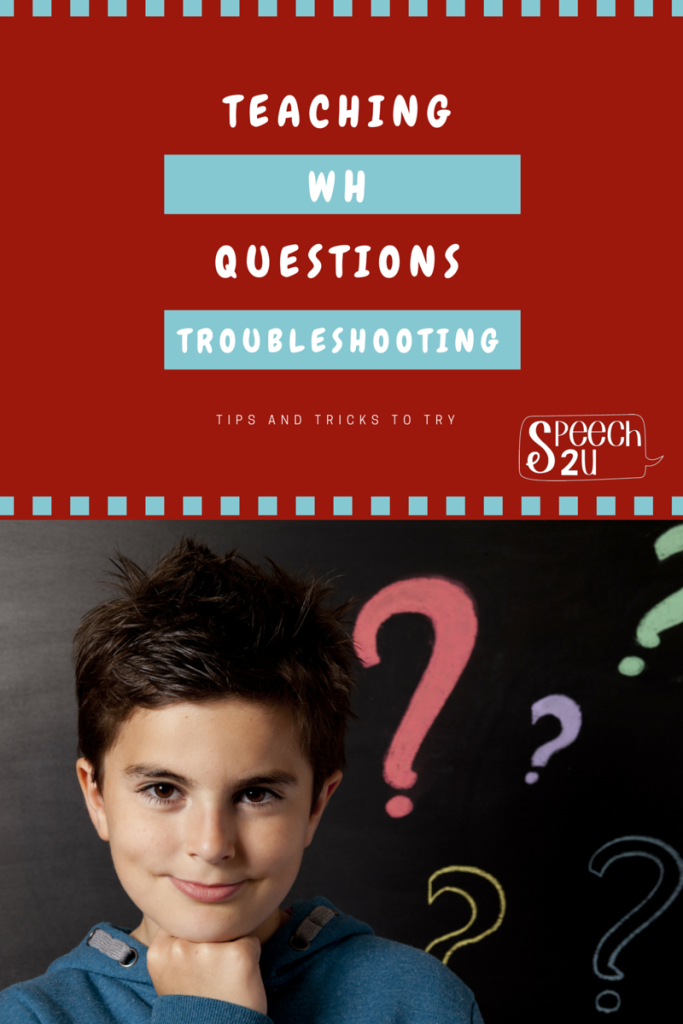Do you have students or clients who have a hard time answering WH questions? Have you ever felt like you are just testing them over and over again in therapy? Children may have difficulty answering WH questions for a variety of reasons. Identifying the main difficulty, can help you determine activities to start treatment. The following are common WH question difficulties:
They didn’t realize you asked a question:
These children may not realize you are talking to them. If you ask them question, they don’t respond.
- Me: “What do you want for dinner?”
- John: *walks away*
I see this generally with clients who are on the autism spectrum or who have attention deficit disorder. I start by working on social turn taking. Fun activities to try include: rolling or throwing a ball back and forth, chase games or other interactive games.
They didn’t realize you expect them to respond:
These are the students that we need to ask a question multiple times. This also applies to my son and my husband sometimes, so you have to use your judgement.
- Me: “What do you want for dinner? What do you want for dinner? Hey, what do you want for dinner? John, What do you want for dinner?”
- John: finally says “oh, tacos.”
I work with these clients and the families to make sure that we getting their attention prior to asking the question. This is the step that I miss with my family. Then we work on only asking the question one time and then prompting a response. I want them to respond to me vs. them training me to ask multiple times.
They respond with immediate echolalia:
When you ask this child a question, they repeat the question or the last words. Here’s what it looks like:
- Me: “What do you want for dinner?”
- John: “dinner.”
This child has difficulty with intra-verbal tasks-where they need to listen to the information/question and then respond appropriately. There are several different functions of echolalia. Want to know more? Check out my post on Echolalia HERE.
Try working on automatic speech tasks: ready, set _____, filling in blanks for familiar repetitive story books and filling in the blanks for object functions (I write with a _____). We need to help this student understand what we are saying, and then change their response vs. echoing our words.
They don’t understand the difference in WH words:
These students have difficulty understanding that WH question words require different responses. For example, they may not understand that a WHO question needs to be answered by a person or a why question needs to be answered with a reason.
- Me: “WHO was on the swing?”
- John: “Because I like to do it.”
I use a lot of graphic organizers with these students. We talk about how a “who” questions require a people answer. Try sorting tasks, using visuals and verbal cues to teach the differences between WH question words.
They have vocabulary deficits:
Some children don’t have the vocabulary or background knowledge to answer WH questions appropriately.
- Me: “Who helps you when you are sick?”
- John: “Batman”
They are answering a WHO question with a person- but it is the wrong person. For these children, I start working on vocabulary skills using language rich activities and literacy activities. Themed units are great for this-you can introduce the vocabulary, reinforce within a book and play activity and then use your visuals to teach receptive identification for the WH question moving towards expressive use.
They have auditory memory difficulties:
Some children have difficulty recalling information that you just said-they may have problems with short term memory. I see this more (or it is easier to see) when you are working on yes/no questions.
- Me: “Who helps you when you are sick?”
- John: “What?”
Try teaching memory strategies such as rehearsal and visualization. You can also have your student practicing listening for specific information. For example, share a story and have the child listen for the name of the characters in the story. If they need additional help, have them raise their hands when they hear a name.
Teaching WH questions doesn’t have to just be drill and kill. By analyzing WH question error patterns, you can target the specific areas where your client needs to work and save time in therapy. I’ll be talking more about specific teaching strategies for each WH question word in September. If you are looking for a structured teaching program for your clients, I’d love it if you’d take a peek and my interactive flashcard products.

You can link up to this post with the Frenzied SLPs by sharing one of your favorite products AND your tips for teaching below. I can’t wait to read everyone’s posts.
 Loading InLinkz ...
Loading InLinkz ...



What a great post! I love that you described so clearly the possible reasons for problems answering WH questions, especially about them training us! Great activity ideas, too!
If you are looking for answering WH questions while carrying over articulation skills, take a look at this: https://www.teacherspayteachers.com/Product/Speech-Therapy-Articulation-Language-Pictures-Bundle-R-S-CH-SH-Sounds-1998239
This is just what I’m looking for right now!
This is a great post! Definitely areas of difficulty that I see a lot with my kiddos, but never quite broke it down like this in my head. Thanks for sharing!
Great tips! I always make sure there is eye contact before asking anything….whether working with students or or trying to communicate with family members.